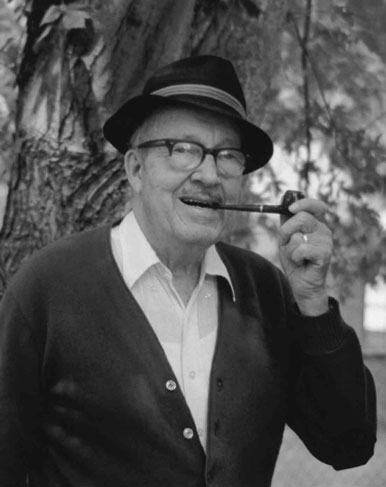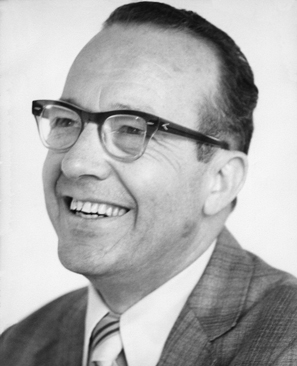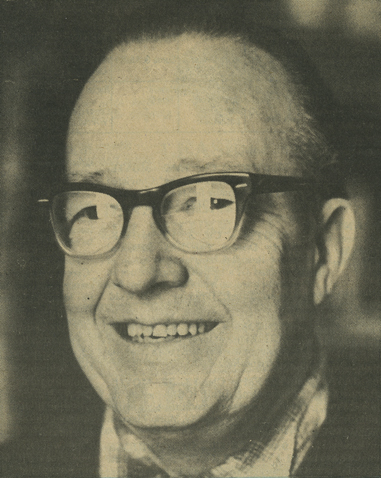



|
|
 |
|
|

Adele Gardner Is Agent & Literary Executor for Delbert R. Gardner Please note that (c) copyright to all photographs on this page except for newspaper photo below is owned by Adele Gardner and/or the Gardner family. Photos were created by Adele Gardner and/or are from her collection and that of the Gardner family. Menu portraits created by Adele Gardner (left & center) and Daniel Michael Hegarty Sr. (right). All rights reserved. |
|||
| |
|||
|
Excerpts from "Rhyme and Reason," interview of "two Hardin County poets, Eddie Burch of Elizabethtown and Delbert Gardner of Radcliff" by Greg Kocher The News-Enterprise (Elizabethtown, KY), Section C, Weekend: TV, Movies, Books, Music, Feb. 1-3, 1985, pages 12C-13C Pull quote published with article: Delbert R. Gardner has a knack for taking the little things in life and turning them into stories with a moral. If his writing has an overall theme, it is "a zest for life, is the only thing I can name right off. I have a lot of other concerns, like the search for identity, a concern with isolation."
Delbert Gardner (above) is a prolific writer of both poetry and prose. His best advice to those who want to be published is to be persistent. |
|||
|
Finding "new ways to see" is the task of two Hardin County poets, Eddie Burch of Elizabethtown and Delbert Gardner of Radcliff. Both are employed by government agencies, both write on similar themes, and both draw sustenance and ideas from their families. Staff Writer Greg Kocher talked recently with these two men about why they write. [. . .] Delbert R. Gardner has a knack for taking the little things in life and turning them into stories with a moral. For instance, there was the time that a friendly dog wound up on Gardner's porch, wagging and thumping its tail. The seed for a short story was planted in Gardner's mind. The story, published in a Michigan magazine, was called "It Shouldn't Happen to a Dog." It is about a dog who learns how to speak and reason as well as his master. Trouble is, he becomes so sophisticated that he falls in love with his master's wife! In "Finger Lake," Gardner recalls the struggle of catching a fish: "Sudden life electrifies
the line "I started out with my experience as a fisherman and appreciation of the beauty of the lake at dawn." And from there he began to think about how long the lake had been there, and how it had sustained life. "I began to think about it as something eternal, an allegory of the world, but I didn't start out with that," Gardner says. Such is the creative process for Gardner, 60, who says he gets his ideas "from all over, a lot of times from dreams. Usually, if I have a striking dream I'll write a couple of ideas in a notebook." But he adds, "Writing is 99 percent perspiration and 1 percent inspiration. Every good writer has inspiration but before he gets much of it he's going to have to be a hard worker. It's like priming a pump. You can't get any water out of the pump until you pour water into it to create the necessary vacuum. "I force myself to put words on paper and not worry how good they are." If his writing has an overall theme, it is "a zest for life, is the only thing I can name right off. I have a lot of other concerns, like the search for identity, a concern with isolation." Gardner has published a dozen poems, five short stories, and a number of reviews and feature articles. He has been published in Poetry Digest, American Poetry, The Christian Science Monitor, Literary Review and a number of regional poetry reviews. He also published a book titled An "Idle Singer" and His Audience: The Poetic Reputation of William Morris in England, 1858-1900. Morris "was a poet laureate in his own time, but he's not popular today," Gardner says. Unfortunately, neither was Gardner's book. "It's so esoteric it hasn't even sold 500 copies yet," he says. An Ohio native, Gardner received his bachelor's and master's degrees at Syracuse University and his doctorate at the University of Rochester. He used to teach creative writing, and was a college English professor for 19 years, first at Lycoming College in Williamsport, Pa., then at Keuka College in Keuka Park, N.Y. Staff cutbacks forced him to go into government employment as an editor in Fort Eustis, Va., in 1979. Three years later, he came to Fort Knox. Gardner, his wife, Marilyn, and their children--Carolyn, 14, twins Theodore and Daniel, both 12, and Melody, 9--live in Radcliff. Gardner edits training and doctrinal literature at Fort Knox. "My concern is to make it clear and consistent and to make sure that it gets across to the audience what it's supposed to," he says. It's not exciting work, but it's a living. Which is more than Gardner can say about the market for poetry: "There's a very poor market for poetry. There's no poet except Rod McKuen that can make a living at poetry." Most of his poems are written in some kind of meter or rhythm. The only free verse poem without such rhythm is about writing. It is called "Cocoon" (1956). "I saw something between a baby being born and trying to communicate--it really is a miracle when a baby tries to speak--and the poet trying to find expression," he says. "I don't find it comfortable to write free verse because there's too much of a temptation to write prose and arrange it to look like verse," he says. Gardner says beginning writers shouldn't be offended if their work is constructively criticized. "Don't treat it as sacred. Be able to rewrite your own work." And they should be persistent in their writing, submitting work for publication over and over until it's accepted. "You have to be able to stand rejection, and after a while, if they're any good, some of them will get published." When he first puts thoughts to paper, he doesn't worry about "whether it's garbage or not." The main thing is to get it down. Then, leave it alone for a while and return to it later, when you have a more objective view about what you've written. "Practice is all I can say. It's kind of an evolution. I think the biggest thing a writer can do is write a lot. I'm hardly ever satisfied with anything I've done the first time. When I work on it again I'm more objective about it, I've separated myself from it. The inspiration doesn't come if you don't work on it."
The interview also includes a box with a full reprint of "To Build for a Day" by Delbert R. Gardner (not included here). |
|||
| With input from her mother, Dr. Gardner's papers, and her personal knowledge of the man, Adele Gardner also responds to interview-type questions on her father's behalf. Visit About My Dad & Me: Featuring Del & Adele for links to these memoir-style writer's statements (in particular, the column "More about Del & Adele" on the right). Also, check out the Artist's Statement about "Dove and Delbo" at Photography & Art. |
|||
Want a behind-the-scenes look?






